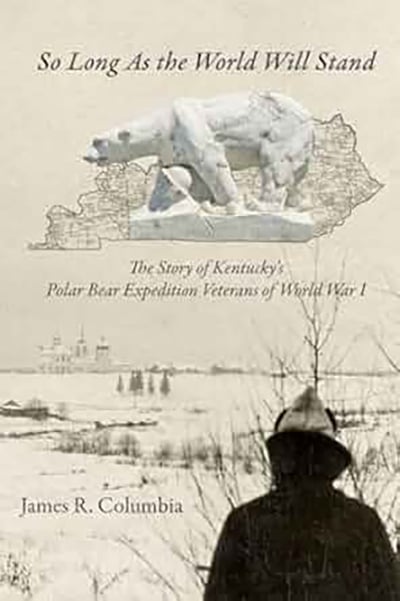By NKyTribune columnist Steve Flairty
It was a frequently forgotten, unreported battle that the Americans fought in Russia. Foreign leaders (British) gave orders, and Americans who were sent appeared to have forgotten their own nation. Only a group of decent people striving to be patriotic and obeying commands were the winners for our nation.
It’s likely that many people who study American history would like to forget this incident. They would include Kentuckians.

In his 2024 book, So Long as the World Will Stand: The Story of Kentucky’s Polar Bear Expedition Veterans of World War I, James Columbia examines in detail how our fellow citizens, representing both our state’s largest cities and its smallest communities, participated in this military action.
On President Wilson’s instructions, our men participated in the American North Russia Expeditionary Force (ANREF), often known as the Polar Bear Expedition, from September 1918 to July 1919. Unfortunately, it persisted even after World War I was declared to have ended on November 11, 1918. Americans engaged Bolshevik forces attempting to topple the Russian government after landing on the country in the midst of a civil war in Russia. In addition to the fighting, there was frequently extremely cold weather, difficult terrain to navigate, and inadequate medical treatment. Approximately 230 Americans lost their lives as a result of illness or combat. It is estimated that roughly fifteen of them were Kentuckians due to a lack of evidence.
The majority of the approximately 6000 Americans who were transported were from Michigan, but more than 200 of them were from Kentucky. The Kentuckians made up 106 of the 120 counties in the Commonwealth by birth, residency, or burial.
These are the fundamentals of how our nation entered this distant fight with some Russian citizens. America was asked to join the North Russia Campaign by France and Great Britain. They cited two reasons: first, to keep material supplies in Arkhangelsk out of the hands of the Germans or Bolsheviks; second, to attempt to save the Czechoslovak Legion, which was stuck along the Trans-Siberian Railroad.
America would eventually depart, and the goals were not entirely achieved.
In his 657-page book, Columbia provides numerous examples of how the engagement was manifesting in Kentucky, including letters and newspaper articles from North Russia. There wasn’t much of the nice kind. For instance, Columbia characterized one trooper as a resentful individual. He was Simon Grant Davis, a Whitley County teacher who had been drafted into the military.
According to an Akron Beacon Journal report, Davis had just returned from the northern Russian wilderness a broken man. The anti-Bolshevik forces were unprepared because of Davis’s damaging claims of British officers controlling American officers and lying about the Bolsheviks, downplaying their level of training. Additionally, Davis stated that the front lines were actually held by Americans rather than the alleged British.
According to Columbia, one of the first public records to reflect an opinion that would be reexamined and supported by numerous later historians was Davis’ interview.
On July 8, 1919, the Paris Bourbon News announced that 51 Kentucky lads had arrived from the Archangel sector in Russia. The boys recounted several acts of bravery and the hardships the men faced in the frigid north.
According to the book’s cited source, temperatures there could drop as much as 60 degrees below zero. According to the Frankfort State Journal, a Kentuckian returning home from northern Russia described it as “like coming out of Hell into Heaven.”
The way that Columbia shares names and their ties to Kentucky is, in my opinion, one of the book’s most intriguing features. Sometimes he provides images.
Since I frequently read about the state and have taken several trips, many of the names I come across seem familiar and inspire me to look into any potential links further. I think the information may also be useful to genealogists.
Whether declared or not, war is hell, and Columbia’s book deserves praise for reiterating that lesson for us in the Commonwealth more than a century later.
I published a column a few months ago on Spirit of the Bluegrass, the new book by Lexington news man Marvin Bartlett. Spirit is described by Marvin as an odd, unexpected, and nostalgic tale from Kentucky.
The book has garnered positive reviews.
More than a hundred people attended a discussion and book signing at Joseph-Beth Booksellers in Lexington on May 6th to celebrate the debut of Spirit. It is now ranked #2 in the General Southern US Travel Guides and has consistently maintained excellent sales rankings on Amazon in certain categories since its publication.
Marvin has made radio appearances in Lexington and Winchester and spoken at events in Columbia, Morehead, and Versailles. His forthcoming appearance itinerary is as follows:
Henderson County Library, July 22, 6 p.m.Visit the Jessamine Tourism Office on August 22 at 5:00 p.m.Book Festival at the Estill County Library, August 30, at noonAuthor’s Roundtable, Mason County Library, September 30, 4:30 p.m.
The success of the book and possibly others in the future excites Marvin.
He expressed his happiness at the high level of interest in these tales of the people, places, and customs that define Kentucky. I think this series will continue for a long time because people who attend the events have been approaching me with fresh suggestions. These stories aren’t mine. I’m just lucky enough to be able to write them down and share them.
Spirit of the Bluegrass is freely accessible on websites like Barnes & Noble and Amazon. Joseph-Beth Booksellers in Lexington also sells it. Contact Marvin on his Facebook page, Fox 56 News, for additional details.





